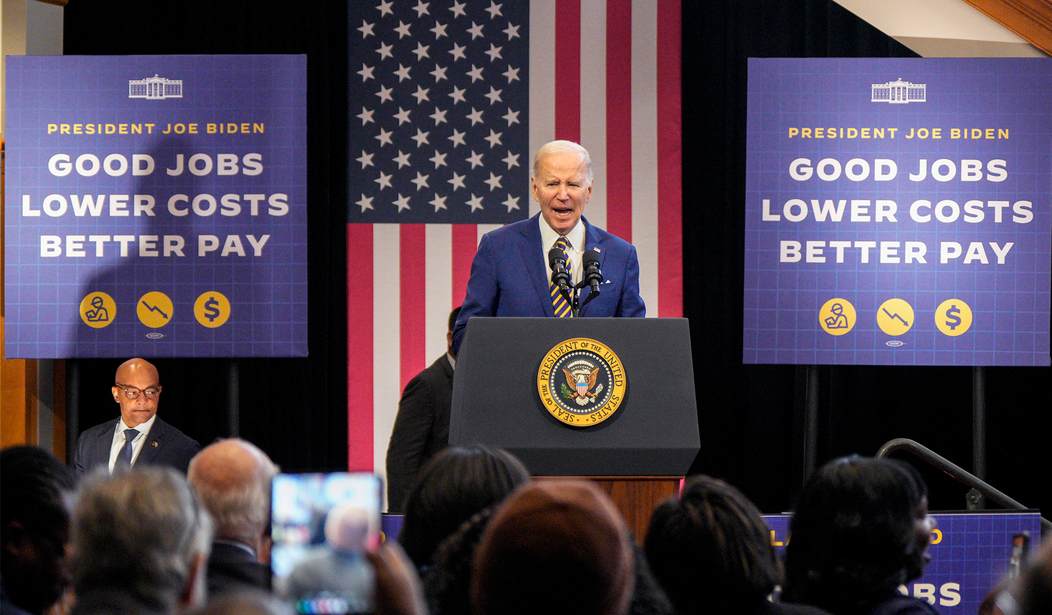"Small businesses are the engines of our economy and the heart and soul of our communities," President Joe Biden said in a July statement that sought to brag about his administration's efforts to invest in small business entrepreneurs as part of his effort to "build the economy from the bottom up and the middle out," also known as "Bidenomics."
Despite Biden's insistence about Build Back Better and its retread Bidenomics producing results for the middle class, small business owners couldn't disagree more. In fact, 43 percent of America's small businesses give President Joe Biden the grade of "F" when it comes to his efforts to help them thrive compared to just five percent that awarded Biden an "A."
That's according to the Job Creators Network Foundation’s August Small Business IQ Poll — previewed exclusively by Townhall — that saw 78 percent of small business employers give Biden a "C" grade or lower.
The Small Business IQ for August — based on questions about employers' businesses, the U.S. economy, current economic climate, and future expectations and calculated on a scale of 0 to 100 with 100 being the best possible conditions and 0 being the worst — came in at 52.5, down from July's 54.8 and the poll's high-water mark of 63.5 seen in July 2021.
August's Small Business IQ of 52.5 is the lowest recorded from respondents since the Job Creators Network Foundation launched the poll in May of 2021, and responses to the survey explain why.
Just 25 percent of small businesses said the economy is "excellent" or "good," a four point drop from July's poll, while 59 percent said the economy is getting worse, an increase from last month's 51 percent.
Among a variety of challenges facing small businesses, the top concern is one familiar to many Americans: inflation. In the Small Business IQ Poll, 52 percent of small businesses rated higher prices as their biggest concern.
Recommended
The second biggest concern — shared by 27 percent of small businesses — was a direct result of the first: client spending given the economy. Logically, as prices have increased, Americans have had to cut back to stay within their budgets. That means small businesses have to compete not just to beat their competitors, but to get consumers to use their shrinking buying power on their goods or services.
In third place, 26 percent of small businesses said general operating costs were their biggest concern, another unsurprising result given the rising cost of energy, rent, transportation, and other things needed to keep a small business operating.
Those concerns coincide with the 62 percent of small businesses who reported being concerned that economic conditions could force them to close up shop.
Compared to last year, 45 percent of small businesses said their financial conditions have gotten better, while 28 percent said things were the same and 26 percent said their financial standing had gotten worse. Small businesses surveyed also shared some optimism that their financial condition would get better in the next three months (51 percent) and they'd be profitable over the next year (71 percent).
Only six percent of small businesses said they'd decrease their employment over the next three months and just five percent said they would reduce employee wages or hours in the same period.
Despite the optimism for their own businesses, small employers still hold an underwater view of the overall climate for small businesses: 42 percent say it's excellent or good while 58 percent say it's fair or poor. And with 43 percent of respondents saying they expect the small business climate to get worse, it's clear they're not expecting Biden to soon correct the error of his ways.
In addition to the direct impact of Biden's economic policies that small businesses say have left them wanting, other ripple effects elsewhere in the economy are a cause for concern as well. The bank failures and related instability in the banking sector caused 59 percent of small business owners to say they are concerned that banking woes will impact their business.
More then half — 65 percent — of small businesses also expressed concerns about new banking regulations making it more expensive to get loans, and 56 percent said their own dealings with local, state, and federal regulations were already "time consuming."
Another consequence of inflation that's made getting loans more difficult is the resulting aggressive interest rate hikes executed by the Federal Reserve. Concerns about the ability to access credit were reported by 66 percent of small businesses, and 51 percent said they were most likely to seek a loan from a small bank or credit union rather than a big bank (26 percent) or online bank (9 percent).
“During President Biden’s time in office, small business owners have consistently suggested that the current economy—characterized by ‘Bidenomics’—is a poor environment to expand operations, hire employees, and innovate," remarked Job Creators Network Foundation President Elaine Parker. "And, if anything, attitudes seem to be souring further with small business sentiment hitting a series low in August," she noted. "As students return to school, small business owners are giving President Biden a failing grade for his harmful policy agenda."
In this back-to-school season, the August Small Business IQ Poll also asked some education-related questions. When queried, 28 percent of small businesses said involving parents was the best way to address declining test scores in public schools. At the higher education level, 90 percent of small businesses — which are uniquely qualified to judge whether graduates' skills and abilities were worth the cost of attendance — said colleges and universities overcharge their students.
The Job Creators Network Foundation Small Business IQ Poll queried 400 small business employers across the country from August 5-30 and was conducted by John McLaughlin and Scott Rasmussen.

























Join the conversation as a VIP Member